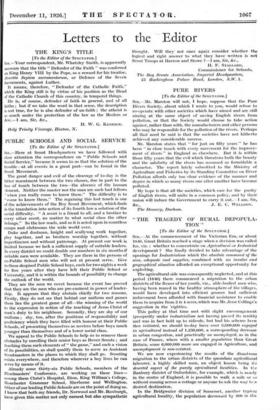PUBLIC SCHOOLS AND SOCIAL SERVICE
[To the Editor of the SPECTATOR.]
Sm,—Here at Scout Headquarters we have followed with close attention the correspondence on " Public Schools and Social Service," because it seems to us that the solution of the trouble—at all events in a great part—can be found in the Scout Movement.
The great danger and evil of the cleavage of to-day is the bitter resentment between the two classes, due in part to the loss of touch between the two—the absence of the human clement. Neither the master nor the man are such bad fellows when you really come to know them." The difficulty is to "come to know them." The regaining this lost touch is one of the achievements of the Boy Scout Movement, which finds in the translation into action of its fourth law a solution of the social difficulty. " A scout is a friend to all, and a brother to every other scout, no matter to what social class the other belongs." So the law reads, and so it is acted upon in countless camps and clubrooms the wide world over.
Duke and dustman, knight and scallywag work together, play together, and as brothers worship together, without impertinence and without patronage. At present our work is limited because we lack a sufficient supply of suitable leaders. In every district we could double our numbers in six months if suitable men were available. They are there in the persons of ex-Public School men who will not at present serve. Give us these despised Public School boys, each for two nights a week for five years after they have left their Public School or University, and it is within the bounds of possibility to change the outlook of the world.
They are the men we covet because the event has proved that they are the men who are pre-eminent in power of leader- ship. It appears that they abstain chiefly for two reasons. Firstly, they do not see that behind our uniform and games there lies the greatest game of all—the winning of the world to the expression in action of the teaching of Jesus Christ of man's duty to his neighbour. Secondly, they are shy of our uniform; shy, too, after the positions of responsibility and proficiency which they have filled with honour at their Public Schools, of presenting themselves as novices before boys much younger than themselves and of a lower social class.
We appeal to the Public Schools to help us to remove these obstacles by enrolling their senior boys as Rover Scouts ; and teaching them such elements of " the game," and such a vision of its possibilities, as shall qualify them to serve as Assistant Scoutmasters in the places to which they shall go. Scouting exists everywhere, and therefore wherever a boy lives he can serve by means of it.
Already some thirty-six Public Schools, members of the Headmasters' Conference, are working on these lines— among them Christ's Hospital, Eton, King William's College, Manchester Grammar School, Sherborne and Wellington. Other of our leading Public Schools are on the point of doing so.
I know that both my friends, Dr. Norwood and Mr. Roxburgh, have given this matter not only earnest but also sympathetic thought. Will they not once agai.1 consider whether the logical and right answer to what they have written is not Scout Troops at Harrow and Stowe Y—I am, Sir, &c.,
H. F. STALLARD,
Commissioner for Schools,
The Boy Scouts Association, Imperial Headquarters, 25 Buckingham Palace Road, London, S.W. 1.














































 Previous page
Previous page